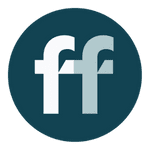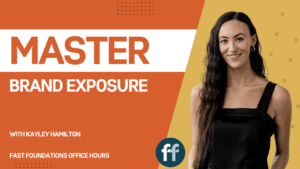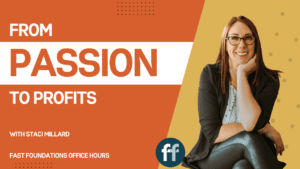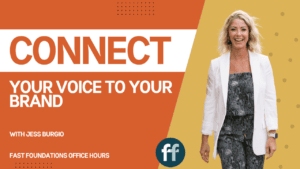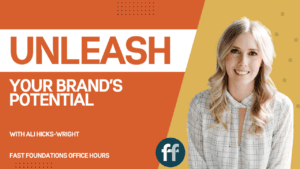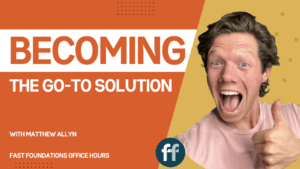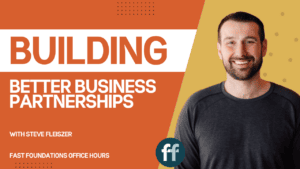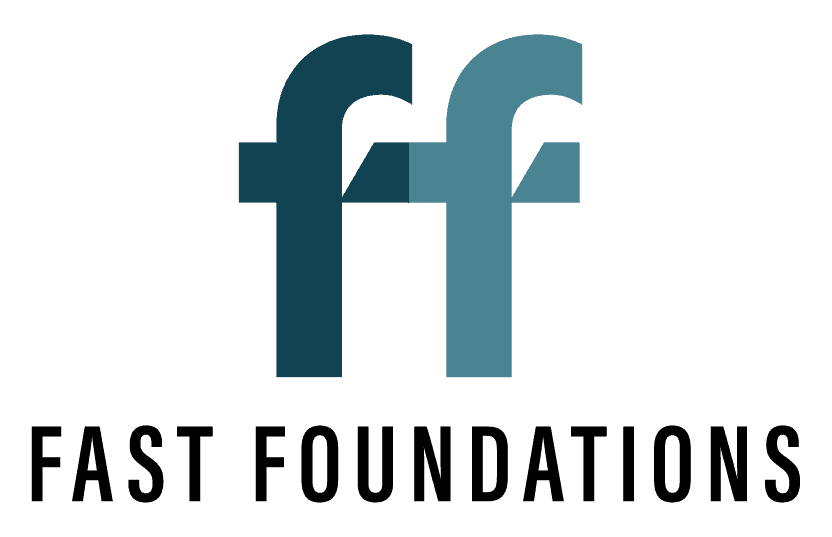The Journey from Corporate CFO to Finding Flow as an Entrepreneur with Bridgette Boucha
Show Notes
Want to feel more fluid and flowy in your business, then get to know your numbers!
In this episode we’re excited to have rockstar alumni and corporate CFO turned entrepreneur, Bridgette Boucha!
Bridgette shares her story of climbing the corporate ladder, hitting burnout, and walking away from her title and identity of corporate CFO.
She also shares how she navigated the time after quitting her job, and what led her to come back to being a CFO, only this time on her own terms, in her own way, as a fractional CFO for entrepreneurs.
Whether you have a 9 to 5, or you’re a business owner, the advice to know your numbers and show up as YOURSELF in your work is universal.
In this Episode, we talk about
- Bridgette’s journey from corporate CFO to entrepreneur, and how she went from burnout to finding flow and purpose in her business.
Listen Now
Connect
Connect with us
Instagram @fast.foundations
Connect with Bridgette
Instagram @bridgetteboucha
Key Moments
02:00 Meet corporate CFO turned entrepreneur, Bridgette Boucha.
04:15 What did your transition look like from corporate to starting your business as a CFO for entrepreneurs?
13:00 Who do you have in your life that are cheering you on in your business?
15:40 Did you burn the boats when you quit your corporate job?
20:15 When is the right time to hire a CFO?
22:00 Who do I need in my “financial success team” and where do I start?
24:40 Why you NEED to know your numbers in your business!
28:00 Using the skills in your business that you’ve gained all along the way.
The Quickest Way to Grow Your Early-Stage Business
The Fast Foundations Community is a network of entrepreneurs who want to grow together!
Whether you are about to make the jump from corporate to launch something new, working on side hustles and want to take those full-time, just starting out on your entrepreneurial journey, or struggling to scale, we are here to support you & don’t want you to continue on alone.
BRIDGETTE BOUCHA (00:00):
As you start to build that momentum and you get some recurring revenue and feeling good about what you’re expanding, you know, ideas are, that’s when we would come into play and say, okay, how do we optimize all of these resources, your time, your people, your money, and your energy? And when you have those resources to be able to optimize, that’s where we would come in. But for starters, get to know your numbers. Get to know your numbers, get them organized. Don’t flip your shit at the end of the year cause your C P A says, I need your numbers and you don’t have anything together, and you gotta pull it all together at the last moment. Get your stuff organized. You gotta tell the universe that you’re really serious about this business and getting your numbers organized is a great way to do that.
JESSICA BURGIO (00:41):
What is keeping you from growing your business to the next level? I’m Jess Burgio, one of the hosts here for Fast Foundations, the podcast Between the three of us, my co-host Jim, RT and I have grown several businesses scaling Beyond Seven Figures. And you know what? Not a single one of those businesses came with a blueprint for years. We poured time and resources into our businesses from salons, tech companies, and product-based businesses navigating success and failures on our own. For all of us, though, it began to change in 2019 when we found a community of like-minded entrepreneurs and industry leaders to mentor us. That community was fast. Foundations just like the Mastermind. We’re bringing on experts in having discussions to give you tips to not only improve the foundational skillsets you need, but to also fast track your growth. We’ll dive into the core pillars of what will make your business succeed. Whether you have a brand new idea that you’re looking to turn into a business or you’re already a successful entrepreneur looking to scale, this community is here to take you to the next level. Let’s dive in.
(01:45):
Welcome back to Fast Foundations, the podcast, it’s your girl Jess Burgio with another amazing alumni from Fast Foundation’s, the mastermind. Bridgette Boucha, welcome to the show.
BRIDGETTE BOUCHA (01:54):
I am so good. Great to be here, Jess. Great to see you.
JESSICA BURGIO (01:58):
You too. I know we were just chatting right before we hit record around how we’ve known each other in the last couple years, but we’ve never actually met, and I guess this isn’t technically meeting, I mean we’re doing it online here as well, uh, but we had a good laugh about it because we’ve both grown our network so much from this particular community that it’s wild to think that you could kind of know somebody so well but yet have never met them. And that speaks to the power of like networking, right?
BRIDGETTE BOUCHA (02:22):
Yeah, yeah, yeah. It’s um, we have all been through or on a similar journey and are rooting for each other from afar, whether we’ve met or not. There’s like this cyclical energy of support and that’s what’s been so beautiful because we hop on the, on the call together and we’re like, oh, it’s kind of like we know each other. This is just the next natural step.
JESSICA BURGIO (02:42):
I know it’s so crazy and wild and I’ve learned that even more as I’m getting to do these podcast episodes because there are a list of over 350 alumni who have gone through the program and it’s wild. I know. And when Artie gave me and Archie, Jim gave me the list of, they’re like, this is what you get to do. And I’m like, how awesome is this job? Like, I like somebody pinched me, but don’t tell them that they just gave me the world’s greatest job, um, of getting to like, check in with people, see how they’re doing after they’ve been through the program and like what’s going on in their life. So I would love to read your bio. I’d love to edify people in real time because I feel like it’s so fun. And then you get to hear how awesome you are.
(03:16):
So Bridgette is a founder, c f o and speaker a former corporate C F O turned c f o for entrepreneurs and a lot of really badass ones. By by side note, she advises from her lived experiences in scaling her own business, making money work for you, and using numbers to make aligned financial decisions. Amen. Her soulful approach to financial strategy, professional development and a personal empowerment has helped hundreds of business owners simplify their money so they can run a profitable business while living a fuller life. Okay, can we get amen, like, is your purpose and power not so rooted in like what you actually do? And I’ve seen this firsthand, like watching from afar via Instagram, um, of all the amazing people you get to step into their business, share your love and your, your expertise as a C F O in corporate and really help these new entrepreneurs step in and grow and scale their business right from the start. Like not right from the start, but literally, right. Like do it the right way. So talk to us how you went from a C F O Life in corporate to this being the next thing. Because there had to be some in between before you hit Fast Foundations realizing this was the next like step in your life.
BRIDGETTE BOUCHA (04:22):
Yes. I was in very like slow foundation mode before I found Fast Foundation <laugh> because as you can imagine, you know, I, I did the traditional career path of joining the, you know, the corporate environment and climbing the ladder and it was kind of all I knew. I just knew that I wanted like this path that was gonna give me, you know, financial stability and freedom and that’s kind of what we dream of and what we’re told that that like success was you get your education and you get a stable job and that’s what it is. And so that was my original path. So in 2016 when I decided that that was no longer for me, I couldn’t figure out why cuz I didn’t have language board at the time. I had done about zero personal development at that time. Um, I transitioned out and decided I was gonna figure out what was next for me.
(05:06):
I didn’t know if it was gonna be in the finance world. I didn’t know if I was gonna dabble in a bunch of different things. Turned out to be both, that transition was really hard for me to be completely honest. It was something that I didn’t quite expect. I thought it was gonna be more empowering when I decided to take control of my life and basically flip it on its head, deconstruct everything I ever knew and then I was like, I need to build it back the way that I want it. But the first three years of that didn’t really resemble that because I didn’t know what I didn’t know. So it was a personal development journey, it was a lot of dabbling. And about halfway through that transition I decided I needed it some skin in the game. I needed to figure out how to go to market with my skillset, my expertise, my voice, and help people help more people.
(05:50):
I didn’t know how to do it. And so that’s how I found, you know, my first mastermind, which was Fast Foundation three years ago and transitioned from this corporate C F O mindset to a CFO f who could really help entrepreneurs in the earlier stages. It tends to be a really underserved group of individuals because they don’t need a full-time, but they do need guidance on how to actually make their dream stay alive, you know, how to use the, the beautiful resource of money to actually carry through. So it’s been quite a ride, it’s been incredible. I am really excited to share kind of bits and pieces here because for those of you that are listening, you’re listening because you’re curious, what does a mastermind do for me? What can it do for me? And when you talk to people like me and Jess and all the wonderful guests that have been on the podcast, I hope you can find a glimpse of yourself in these stories so that you can then translate that into action, whatever that looks like for you.
JESSICA BURGIO (06:46):
So good. So true. And you know, it’s crazy because I’ve actually been having conversation around that humble pie of what it looks like for early entrepreneurship, especially if you already had a semi successsful or very successful first run in your career, whether it was in corporate or for me, it was in the beauty industry 20 years, you know, established doing really well. Um, and then stepping into this new space. And it’s, it’s funny because we expect to grow faster than we did say in that early stage career. But if you go back to your first three years in the business that you were in, it was slow growing for me there too. But we see this after effect that people take a course or they’re in a program or let’s even say they’re in a mastermind and then they wake up the next day and they’re making six, seven figure pluses and you were like, wait, so did, how did that happen?
(07:31):
And we, we don’t get to see the in-between stuff of what’s really going on. But you said something before too that you didn’t know what you didn’t know. And RT and Jim and myself all in those first couple episodes of this podcast talked about that and we talked about what got us to that point in business and the success that we did have isn’t what we knew wasn’t gonna get us to the next level because we hadn’t been there yet. And you know, I think you got lucky by fi finding fast foundations when you did because you know, being able to network at that level and have access to people who those people knew like that changed the game for you and showed you what was possible, where your skillset could fit in. And to me I think that’s like such a gift, right? And that’s what I think, again, like you said, the power of a mastermind is, and I hope the people listening are curious and that either they’ve been through a program, maybe it wasn’t the right fit or they weren’t ready for it. And to know that, you know, you did not just one round, you did three rounds. So talk us through like why you stayed in the group and kind of what that, what that did for you and your business.
BRIDGETTE BOUCHA (08:31):
Yeah, it’s interesting, I get this question a lot because you know, you start to look at the investments that you make and, and what you expect. You know, going in is o oftentimes different than what happens on the back. And you get more, you get maybe different gifts, you get different seasons of your business. So I’ll kind of look at them individually because when I first joined I didn’t know anybody that was in a mastermind. I didn’t know anybody in the room. There was absolutely no relationship outside of listening to, at the time Chris and Lori’s podcast that, you know, they were hosting at the time. So I decided I was going to get myself in this room, figure out what these entrepreneurs knew that I didn’t know because, you know, I left corporate. I was like, where the hell’s my money? Where’s my team?
(09:10):
Like I don’t, how do I do this? I don’t ever sell anything, you know, I’m kind of like overhead being a corporate C F O, you’re just, you know, you’re in a different position in a business than you are in an entrepreneur. And it did very little to prepare me for that honestly. So first round was me figuring out like, where do I belong? Like do I even belong here? What, what are these people talking about? What language are they using? And it was very eyeopening and very humbling and very challenging for me the first round because I was dealing with my inner doubt and my critic of do I actually belong here? Do I have a business? What does this look like? These people are just so excited and passionate and some of them had met the first round, so there was clearly already relationships there.
(09:51):
And so my goal and my intention for that round was really just to show up and, and start to learn what was possible, develop some relationships and all of those things. So it was a six month program, I believe at the time, five or six months. And we had two in person. So when it came to the conclusion of the first round, I had absorbed all of this information and I had a bunch of ideas and I was able to find the support in the community of the group to try new things cuz you wanna try new things when you’ve got that support. If anything, you want to make sure that those are the times that you’re trying them when you do have the support of the community and the feedback. But we got to the end of the round, you just knew I hadn’t finished what I started.
(10:29):
So for me, I felt like we are, you know, the, the group meets you where you are and then gets you to the next milestones. And for me, I was like, I’m kind of there but I’m not quite there. I’m gonna join again. I’m gonna do this from this lens with this level of experience that I now have so that I can show up differently. Because the range of people that are in that room are pretty wide. You’ve got some early, early stage, you’ve got some people that have kind of figured it out in our scaling. And so round two for me was all about showing up in that new frequency, feeling more confident when I got up there to give my little spiel with the microphone showing up in the in-person just in a way where I felt like I’m gonna actually be that person that I needed when it was my first round.
(11:14):
Because that is intimidating sometimes when you walk in. But I can tell you with the energy of this group and the just kindhearted people there, everybody wants each other to succeed. So I was able to step into that role and show up differently. Now what I didn’t know, nor did any of us at the time, was the world was about to shut down a day after we finished our first in-person. And so second round was one in-person and virtual. And the gift that that gave me, I’ll tell you with 100% certainty was the world was about to shut down and I had 50 new friends and we could figure it out together. And we were able to then go through the pandemic with the support of each other. What are we doing? How are we serving? How has the environment changed? What can we put out there in the environment to help people in the situation?
(11:58):
And being covid and being a pandemic during that time, money was on everybody’s mind. People were scared shitless. Oh my gosh, I don’t have an income. What’s happening? It’s two weeks. No it’s two years. Like, it was just crazy. And so the gift that that gave me was this platform. So I started doing research on P p P loans and idle loans and all these different things. And I started messaging with Chris, um, at the time who was the host, um, or the, you know, creator and I, I got this platform to help people. We would hold side calls, we would deliver resources, we would help coach people through it. And it became something that allowed me, as tragic as it is overall, it allowed me a place to find my voice and my purpose and really help people through something that felt scary and at the, I I didn’t know it at the time, but that ended up being a big stepping stone for me as I went through that round and developed a lot of relationships and trust with people.
(12:52):
And by the end of round two I teamed up with my business partner, Amanda. We created a C F O team to serve entrepreneurs. We announced the program and the response was incredible. So I join joined the third round because you know, I wanted to be in that space again, that energy with this new idea that I had. And that’s kind of how it took me through the third round. But yeah, three rounds, y’all, it’s every stage is different and everything has its season and its meaning. And for me it took me three rounds. That’s that’s what I needed.
JESSICA BURGIO (13:22):
And to give you context of time, that’s about a year and a half that she had the support of being in that mastermind live in person. And, and again that’s access to minimum 20, 30, 40 new people, um, each round because a lot of people redo the round. So they would take upwards of 50 people per round. We still do. And that’s the really cool thing is like you keep expanding and growing your network and you’re always, like Chris always used to say you’re one question, one ask or or one person away from your next step or your next answer to something that you need. Um, and creating like something an avenue for you that you didn’t even know that was gonna be your thing. Like that’s the power of getting into the rooms and doing this kind of stuff. Uh, and you said something else too about having that, not just accountability but having like everybody in these rooms wants to see you win.
(14:06):
You know, it’s like where in your life do you have that type of energy and support? A lot of people don’t have it to that level. They might have really awesome people in their life, family, friends who support you like sure go chase your dream, but they don’t understand what you’re going through. They don’t see what that grind looks like. They don’t see the little things that are challenging or holding you back or would maybe make some other people quit if they didn’t have that person to talk to them about it or talk ’em through it or, or be in community with being like, oh, I’m not the only one that deals with this, all 30 of you do. Oh, that’s interesting. Okay, I’m not special in my pain. Um, and I can find answers to this. I mean, that alone keeps people in the game because how many entrepreneurs do we know that start a business, try something for a little bit and then just quit and go back to the, that comfortable bubble that they were in doing the same thing they’ve always done. Uh, so many people, and I, I don’t even know what the stats are for new businesses, right? Brick and mortars are one thing cause that’s kind of most my expertise but online. But I can’t even imagine how people start or think about starting a business and then never get to the point of actually making money in that business. Right?
BRIDGETTE BOUCHA (15:07):
Absolutely. You need the playground, you need the support, you need the ability to think freely, think bigger, think you know, and, and pivot. I think there’s a lot of, sometimes, especially in earlier stage, I can’t tell you how many people over those year and a half pivoted, uh, I’m gonna try this, that didn’t work. Okay, I need now I’m gonna go this way. And and a lot of times your point Jess, is if you don’t have that support, you might just stop dead in your tracks and go back to the easy route, which for me would’ve been corporate, believe me, I considered it right when things got tough. But when you’re in the support of a group, you can get the feedback, you can get, um, you can share audiences, you can collaborate, you can hire each other or just support each other. You can barter, you can just be peers and knowing that those people are out there and able to kind of hold space for you is huge.
(15:53):
Because to your point, I have amazing friends and family love them. They’re in my life for a reason, but it’s usually not to scale my business, not to help me hold the space where I need it in this journey. And so when you have that, you can absolutely feel unstoppable as you go through the program because you know that there are going to be people at any given stage that you can relate to. And sometimes you wear the shoe and sometimes I wear the shoe, but we both need each other, right? So it’s a beautiful thing to be able to have. And I am quite certain a hundred percent certain, if I did not join the mastermind when I did that, my path would look very, very different because they have become my closest friends, my network, my friendships, my clients, my collaborations, and I just, my people are my gold. And a lot of ’em started in my fast foundations round.
JESSICA BURGIO (16:42):
Oh my God. Let’s get into that. But let’s start first with something that you said too, because I feel like a lot of people think if, if they’re stepping into entrepreneurship, you know, you need to burn the boat, you need to quit the job and go all in. Did did it look like that for you? Or what was the transition for you from corporate into, let’s just say when you first joined the mastermind?
BRIDGETTE BOUCHA (17:00):
Yeah, it’s, it’s really interesting because I didn’t know what I wanted to do. I just knew that my body was telling me I’m burnt out, I’m disconnected what I wanted all along and served me really well for 15 years. All of a sudden didn’t feel right and I couldn’t unsee it. I started to underperform and I didn’t want to do that. I’m very much a gold star chaser. So for me to underperform and feel really impatient, I’m like, something is really off. So my bright idea was I’m gonna quit. I’m gonna give him a four month resignation and then I’m gonna take, you know, two to three months off and just recharge so that I can come back to corporate in a way that feels better. Well, you know, spoiler alert, six years later I never went back. And the reason was I got out of it and then I kind of couldn’t unsee this possibility and I wasn’t sure what it was.
(17:46):
I dabbled. So if anybody’s listening out there and they’re like in a corporate job and I’m really specific to a role, so was I, I was a corporate C F O I left, I wanted nothing to do with C fing. I, because it, the definition and the meaning I assigned to it was burnout. So I dabbled in network marketing, I wanted to walk dogs, I did some corporate wellness consulting, I did a lot of things in that first year to just kind of get by and figure out what I wanted to do. And then I went back to corporate, like kind of fractional C F O work. So what I realized that I did is I made all these changes and then I kind of didn’t change enough. I went back and I did this fractional C F O work for companies where I was basically doing what I was doing before just without a boss.
(18:31):
I’m like, well this didn’t work. I still feel kind of icky about it. And that’s when I found the fast Foundation’s transition of being able to say, okay, so let me see how I can go help people differently. And to your point, what you said earlier was yes, I went in thinking I was gonna scale this fractional corporate C job. And what I came out with was, wow, these people are so fucking amazing. They’re passionate, they’re driven, they’re so excited to share their, they’re talking about marketing and funnels and families and launches and all these things. And then when it came to money, it was as if they froze solid. And I was like, okay, this is where I can actually help simplify some things and help work through some money stories that definitely come up, not just for entrepreneurs, for any human <laugh>, nobody’s immune to dealing with money, right?
(19:22):
So it kind of converted from who my client was and what I realized was I didn’t need the corporate title, I didn’t need the corner office. I didn’t, nobody can take my skillset away from me if I just bring more of me into it and now start to apply it to a group of people that are now in the same journey that I’m in. I’m an entrepreneur too. Like I get it. It could be a total mind fuck sometimes. Like we know and that skillset there to like talk about that same language that they’re talking about and help them put some systems and frameworks in place, holy, I mean that would be, that would feel good all around and I could help them bring their gift to the world at a larger scale once they had these things in place. So that’s really how it came about. It was getting in the room and listening to people and understanding where the fears were. Because money oftentimes comes with like fear and shame, right? And I want to shift those conversations and those mindsets to be able to have money represent potential and possibility. Cuz it really allows you to do a lot of good in the world and it’s about making those small shifts to be able to see how you’re able to do that. So that’s been the fun part of that shift for me and I, the clients that I get to work with,
JESSICA BURGIO (20:36):
A hundred percent, are you kidding me? I’m even be able to reframe someone’s like thought around money, how they make money, what they do with money, their ability to make a lot of money Like that is such a gift. And if you truly want to be an entrepreneur, the idea is to be profitable. So, you know, and very profitable at that, right? Because then you can employ more people, you can create more impact, you can, you know, be in charity more. Um, okay, so for anybody listening who’s like, the story is amazing, but wow, Bridget’s really interesting. I don’t really know what A C F O is or does I have started a business but I’m at this stage. When do I need a C F O? And, and what does that look like? How do I even go about finding somebody like all the things?
BRIDGETTE BOUCHA (21:15):
Yeah, it’s a great question and I get it a lot and I, I I really want to educate people and empower people to understand what a like financial success team could look like for them and what that looks like in different seasons of the business. So, you know, if, if you are, um, just starting out and you’re starting to generate some revenue, you start to have money as a resource and it’s kind of circulating, right? And as you start to grow, I would say our, we work with clients around like the two 50 k to multi, you know, six figures to million. But when you start to look at money as the resource and you need to figure out, okay, I’ve made money, like what do I actually need to do with it? Your C F O, so chief financial officer is what that actually stands for.
(21:53):
I do get that question a lot is gonna help you look at that on a la a larger scale on a long term. Like, okay, what are you going to market with? What are you selling? When are you selling it? What’s your cash flow look like? Are you pricing profitably? Do you have contracts and agreements in place? The full bigger picture of your financial strategy are the things that I deal with and I love more than anything to jam about business. So I bring the marketing strategies to leadership coaching, like anything the woo like all of it is a lot of fun for me. But that is only one piece of what we do, which is why I have my business partner, Amanda. Amanda handles the, um, she manages the bookkeeping side of things. So she has a team, she does the financial operations and workflow to make sure that you’re actually set up with the systems in place to be able to do your thing.
(22:42):
Cuz when you scale, you have to have the systems and support in place to be able to do so without burning out. And so that’s Amanda’s like she does, she deals with the CPAs, the tax return, she does all of that side. So collectively we kind of make a part of a financial success team. The other parts would be your CPA who does your tax filing and annual tax strategy, and then your financial advisor on the personal side. So when we optimize your business and you get to take home more money, that person will help you say, how do I invest it? What are my goals? Do I want to buy real estate? Do I wanna invest in in funds? You know, do I, you know, there’s charitable, you know, type thing. Like what is it that I actually want out of this? And so we love to be able to educate people about the differences between those roles and to kind of answer the question of, if you’re sitting there listening and you’re like, okay, I’m, I’m chasing six figures. Ugh, I’m not even gonna say chasing, I always say, what you chase things right away. I am scaling to six figures or I am scaling and I’ve got these resources. When you have consistent revenue generation, you’re to have to start making some financial decisions as to where to put it. And that is something that we help with. So that would be, money’s got to be the resource that’s available for us to be able to manage it.
JESSICA BURGIO (23:58):
Makes sense. So if someone’s starting out, and that’s the goal, right? I want someone to eventually be able to manage all the money that I’m making, but I’m still pretty early stage. What resources or where can I go to find out more information to help me get to a point where that’s gonna be my quote unquote good problem to have.
BRIDGETTE BOUCHA (24:13):
Yeah, it’s really exciting. So there’s a, there’s a lot of resources definitely out there that are, you know, so maybe, um, it’s kind of like, like I’m never gonna be your first hire unless you’re a startup. Like, you know, cuz again, you have to have the money to be able to manage it. If you’re a startup, you need financial modeling for investors and different things, that’s kind of a different vote. But, um, for, for the earlier stage, you know, entrepreneurs, I would highly recommend that you have a couple things in place. You have visibility to your cash flow. You have a bookkeeper at a minimum who is keeping your records up to date so you can actually see your numbers cuz your numbers are telling the story of your business and you really can’t change it if you’re not looking at ’em. You know, and if you measure it, like, like anything, what gets measured gets changed.
(24:55):
So you’ve gotta be able to have visibility to it. So earlier stage I would add a minimum, um, invest in a bookkeeper and then also, you know, making sure that you’re setting, i I call it a monthly money date. Um, you can do it more frequently, but basically setting that date with your, with your numbers to make sure that you’re understanding the behavior of everything. That’s really early stage and that’s a great place to start that stage of business. You need to work on generating revenue. So that’s gonna be your business mentors, your masterminds, your coaches, your marketing strategies, those kinds of things for that early stage to start building that momentum. And then as you start to build that momentum and you get some recurring revenue and feeling good about what you’re expanding, you know, ideas are, that’s when we would come into play and say, okay, how do we optimize all of these resources, your time, your people, your money and your energy. And when you have those resources to be able to optimize, that’s where we would come in. But for starters, get to know your numbers. Get to know your numbers, get them organized. Don’t flip your shit at the end of the year. Cause your CPA says, I need your numbers and you don’t have anything together and you gotta pull it all together at the last moment. Get your stuff organized. You gotta tell the universe that you’re really serious about this business and getting your numbers organized is a great way to do that.
JESSICA BURGIO (26:10):
I bet you’ve seen so many people getting to that point of almost needing you in their business, right? They’re hitting like 1 50, 2 50, maybe even they’ve had some three, four years and they’re, but they’re, they’re not paying attention to the numbers. They haven’t done the basic work of the monthly meetings with themselves with the money dates. They haven’t got the c p A, they’re just kind of weighing it. They make money but they don’t quite know what to do with it. And they spend more than they’re making on different sorts of things and, um, nothing’s quite repeatable yet in their business. Um, getting back to those foundations, even in the beauty industry, I’m thinking of all my o of my salon owners and the people that are independent stylists that are hitting maybe early six figures, maybe even like moderates, you know, you know, one to 200,000 a year, but they haven’t figured out those numbers cuz they’re not paying attention to those fundamental things.
(26:53):
So you guys listening, if you are an early stage entrepreneur and you’re listening to this podcast, yes, the mastermind is for you to grow community, but listening to what bridge it has to say about just getting really, really like best friends with your money in order to, to make more and to know what to do with it as you start to make it. Because I think the goal of every business is to need a C F O in there. Um, but your CPA fir first and foremost. Like I learned that the hard way not having someone do it my books even when I was starting out. If that’s not something you love to do, like get comfortable buddying up with someone in painting for that hell, because I think that’s next level and, and paying attention to your business otherwise, you know, maybe entrepreneurship’s not for you.
(27:29):
Like if these sorts of things make you wanna like run to the hills and not pay attention to ’em, getting a paycheck might just be the answer. And I love Lori Harder used to always keep it real, real honest and her podcast and she was like, it’s okay to try out entrepreneurship and if it doesn’t feel like a good fit for you, like there’s way, there’s other things you can go back to in doing, um, but there’s no harm in trying. And if you do try, like, try, try like join the mastermind, ask the questions, get the resources so that you can honestly say that you gave it a fair shot. But you also touched on something else about pivoting and so many people starting in the program and then having these big like, epiphany pivot moments where we are seeing them doing things that were completely different than what they came in maybe thinking they were gonna do.
(28:09):
And I think that’s a beautiful thing to talk about because in this space, a lot of times you might not know your skillset until someone else sees it in you. And it’s a beautiful thing. Like Alex Street is a perfect example of that. We talk about him a ton on the podcast of just like him not even knowing his greatness and being able to help people pull out their story to share in marketing and business. Um, and so many other people like Jackie Service, she was in human resources and she was in the corporate world forever, but wanted nothing to do with it. And then now she runs, um, a recruiting agency. So it’s, it’s so interesting, um, where you can find that skillset that you think maybe nobody else really needs and, and turn it into a profitable business and then scale it and then hire someone like Bridgette to come in and run yo shit. <laugh>.
BRIDGETTE BOUCHA (28:52):
You guys, like you’re listening, you think about it. Everything that you’ve done to this point as seemingly unrelated as you might think it is, is priming you for the next step. So I talk about my 15 years in corporate, nobody can take that experience away from me. When I left the corporate job, my confidence went with it. I didn’t realize I was so connected to it and it was crazy. It took me a while to get all that back and realize, whoa, wait a minute. I’m still the same person who gathered all this experience when I did corporate wellness consulting, when I did network marketing, when I dogs, whatever, that all shows up in how I serve today. So don’t think that anything is unrelated or not of value or not of use. You know, we think of the traditional getting your degree, getting your corporate job, all of that stuff.
(29:36):
If you, and then you hear, oh, you’re not using it, you are using it. There is a, there is a reason that is what makes you unique is that you pull all of those personal experiences, professional work, jobs that you’ve had, relationships that you’ve built, all of the lessons that you’ve learned, that is you, that is your gift. And nobody can do that because nobody has that same fundamental footprint that you have experienced. So you’re actually doing a disservice if you show up and, and keep some of that on the back, right? My life got so much easier when I started showing up without all the layers, without all the game faces, without, I was like, holy shit, this is what alignment feels like. I’m actually don’t have to be exhausted for trying to be anybody else because I’m gonna tell you, if you put yourself out there as your own authentic voice, if you swear, if you’re woo, if you’re not either of those things, how else will your people find you if you don’t show up that way? And I did it for years. I credit a lot to corporate. I don’t wanna poo on corporate by any means. It gave me a ton of stuff. However, I can see the difference now that I can show up in my own voice, in my own self and the people that are coming and the energy that’s circulating around me. I’m not gonna say it’s easy, but it feels a lot more fluid and a lot more flowy and a lot more fun than an ever did before.
JESSICA BURGIO (31:02):
Ugh. Oh my God. Let’s just leave them with that. If you wanna feel, feel more fluid and flowy and fun in your business and entrepreneurships on your heart are calling you, or if you’ve been struggling to scale or grow because you don’t have the community, if you don’t have the right support system, if you don’t have the people in your corner telling you that you can do big things and challenging you to think even bigger or sitting next to your next business bestie or hiring someone who’s across the table from you who could help take your shit to the next level, this mastermind is for you. And I hope you love this podcast as much as we do because it’s really impacted both of our lives. Um, the mastermind itself and with our new fearless leaders, Jim and rt, um, they’ve just brought it back to life and in person because it was Chris and Lori’s dream to have this continue on. And I’m, uh, so lucky to be a part of it. Bridgette, we’re so lucky to have your influence and to still go on and do great things and pour back into the community when you get the opportunity. So thank you for your time. Uh,
(31:55):
if you guys love this episode and you got any takeaways, we would love to hear from you. Um, tag us on social media. Bridgette, you’re on Instagram? Is that where you like to hang out?
BRIDGETTE BOUCHA (32:03):
Yep. My favorite place.
JESSICA BURGIO (32:06):
yeah <laugh> me too. Holler at you girls on Instagram. Uh, and we will see you guys on the next episode of Fast Foundations, the podcast.
(32:15):
Thank you so much for tuning in. For more free business tips like this, make sure to subscribe to the podcast and follow us on Instagram at Fast.Foundations. What was your biggest takeaway from this episode? We wanna know, tag us on Instagram, share this episode with a friend, and leave us a five star rating and review so we can reach more incredible entrepreneurs. Like you. We’re so glad to have you as part of our community. Go to our website fastfoundations.com for details on our next in-person event.
(32:50):
This podcast is sponsored by Carter and Custer agency at carterandcuster.com.
Join the Fast Foundations Newsletter
Don’t miss out on the latest from Fast Foundations.
Subscribe to our newsletter and we’ll let you know when the next episode drops!
